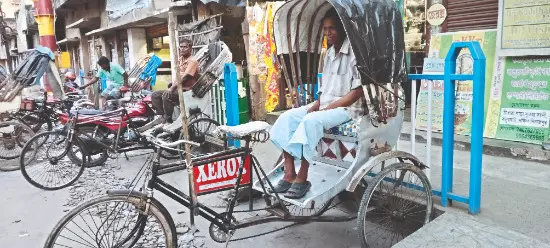Vanishing wheels of Balurghat: A farewell to the town’s rickshaws

BALURGHAT: Before the whir of totos (electric rickshaws) claimed the streets of Balurghat, it was the quiet strength of the cycle rickshaw that ferried the city residents — a three-wheeled symbol of resilience, memories and deeply rooted human connection. For decades, these modest vehicles formed the necessity of everyday life, transporting people through joy and sorrow, urgency and routine.
Once numbering nearly 500 across the city — plying popular routes from Tank More to the Bus Stand or Dunlop More to Chakbhrigu — today, less than 50 remain. The rise of totos over the last seven years has nearly wiped them out. For the few still pedaling, life is a daily battle against age, dwindling income and invisibility.
With padded seats and a protective hood, often shielded further by makeshift plastic curtains during monsoons, the rickshaw wasn’t just a means of transport — it was a companion. The soft melody of its handle-horn, the occasional glow of a headlight fixed by more enterprising drivers — all were familiar sounds and sights in the lanes of Balurghat.
In an era before digital media, these rickshaws served as mobile billboards for local cinema halls. Loudspeakers would be strapped to handlebars, film posters pasted at the back and show timings announced around town — promoting blockbusters like Amanush, Sholay and Anusandhan long before trailers became viral. Take Haripada Natya of Khidirpur Dattapara. For 25 years, he’s cycled through Balurghat’s lanes. Sitting near Dunlop More, he recalls: “I bought my rickshaw with a loan and repaid it. I used to earn Rs 500 to Rs 800 a day. Now, it’s barely Rs 200. My son works in the municipality but we’re six people at home. I’m past 60 but I ride daily —just to survive.”
Tipu Das from Saheb Kachari has been at it since 1973. His voice trembles as he says: “Totos ended everything. Young people don’t even see us anymore. Only a few elderly customers remain. I earn maybe Rs 150. It’s enough for some rice and vegetables. My sons live separately. My wife and I live off this rickshaw.”
Stories like those of Bhombol Natya of Khidirpur and Nikunja Barman of Khadimpur echo the same heartbreak — aged men, bypassed by technology, clinging to what was once their pride and purpose.
Once the soul of Balurghat’s middle class, the rickshaw now survives only in fading memories and the stubborn spirit of a few who refuse to quit. Their wheels may slow but their stories still roll on — quietly, poignantly, like echoes of a simpler, more human time.



